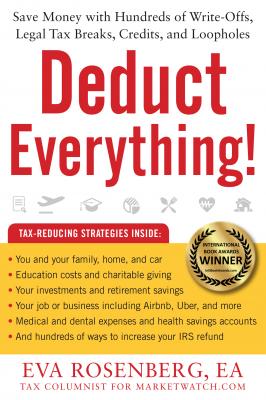Deduct Everything!. Eva Rosenberg
Читать онлайн.| Название | Deduct Everything! |
|---|---|
| Автор произведения | Eva Rosenberg |
| Жанр | Малый бизнес |
| Серия | |
| Издательство | Малый бизнес |
| Год выпуска | 0 |
| isbn | 9781630060480 |
Tip #23:
Your least expensive tax software option is TaxAct.com. Their highest priced service costs less than $35, including one state. Most of their support is via email or online chat. But they have excellent resources. One other really great tool they have is for nonfilers. Their website provides access to prior-year software for individuals and businesses as far back as 2008. (Shhh . . . don’t tell anyone, but H&R Block tried to buy them up several years ago. In 2011, the US Department of Justice prevented the purchase due to antitrust issues: http://www.justice.gov/file/498231/download.)
Tip #24:
Three other top software options. CompleteTax.com, 1040.com, and TaxSlayer.com used to have very low prices. Due to all the new complexities and reprogramming needed for Obamacare, as well as protecting against identity theft and fraudulent tax returns, their prices have risen to more than $50 to efile both a federal and state tax return. They are all highly reliable and reputable companies with solid tax research behind them—and members of the IRS Free File Alliance.
Tip #25:
Warning! While you may find new companies popping up offering great prices for online tax preparation, please be careful. The information you enter to prepare your tax returns is exactly the kind of information needed for identity theft. So if you have never heard of the company and they don’t spell out who is behind these great prices, avoid them. Try to stick with the list of companies on the IRS’s Free File Alliance (https://www.freefilealliance.org) list—even if you are using their paid services. You know the IRS has been working with them for years.
Choosing a Tax Professional
AS THE PREVIOUS CHAPTER pointed out, millions upon millions of people can, and do, prepare their own tax returns. But should you? Let’s explore criteria for why you may need to consult a tax professional, as well as what kind of tax professional you should hire if you need one.
Tip #26:
Financial issues that require a professional. Don’t prepare your own tax returns if you have these issues in your financial life:
• A business of any kind—whether it’s as a sole proprietor, partnership, corporation, LLC, farm, ranch, multilevel marketing, network marketing, affiliate sales, pyramid schemes, and so on.
• Hobby income—whether you believe it’s a business or not.
• Disability income, workers compensation, or other insurance proceeds that you’re not certain are not taxable.
• Lump sum income from Social Security Disability or SSI (after several years) or pensions.
• You are (or a family member is) age 72 or over and have IRAs and/or pension accounts. They require mandatory distributions.
• Divorce, alimony, child support, family support, or disputes about dependents.
• Dependents who don’t live at home, who are out of the United States, who don’t have Social Security numbers, ITINs, ATINs, or other US-identifying numbers.
• Complicated investments including short sales, wash sales, stock splits, PFICs, flipped real estate, racehorses, and other things you may not understand all that well. If you don’t know what the initials stand for or what something means, don’t invest in it without consulting a tax pro first.
• Sales of any assets at all—especially real estate, business assets, collectibles, and eBay-type sales.
• Rental real estate of any kind, like roommates, bed and breakfast, short-term rentals (like AirBnB), studio rentals, time-share rentals, and so on.
• You are a first-time home-buyer.
• Complicated mortgage issues—you refinanced with balances higher than the original loan, loan modifications, balances over $1 million, multiple homes, private lenders, or your name is not on the loan or title.
• Scholarships, stipends, grants, prizes, winnings of any kind.
• Kiddie tax issues that you may not even realize you have.
• Gambling winnings and losses—casinos, clubs, bingo, lottery, and so on.
• Employee business expenses.
• Investment interest and other investment expenses.
• Complicated or high charitable contributions—especially for volunteer work, donations of high-value goods (art, vehicles, securities, more than $1,000 of clothing and household goods), and other things that require more substantiation, appraisals, or expertise.
• Military service—there are special benefits for both state and federal you don’t want to miss.
• Disasters, casualties, forced easements—whether personal or business, all have special benefits you can use to your advantage.
• Gifts that you made or received of $14,000 or more per person to/from any individual, including money you received from crowdfunding sources like GoFundMe, KickStarter, and so on.
• You have ownership or signature authority over any financial accounts overseas—whether for yourself, your (elderly) parents or clan, your children, an estate, trust, or business. You own a share of the family business. You have a vacation home outside the United States.
• You have any extra taxes, like the Net Investment Income Tax (NIIT), the extra Medicare tax on wages or self-employment income, household employee taxes, excise taxes, and so on.
• You might be entitled to tax credits for your child(ren), low income, education, energy, retirement, or a whole raft of other things you might not know are available to you from the IRS and/or your state.
• If you have any questions and really want to sit down and talk to a tax professional.
Tip #27:
All paid preparers must have a Professional Tax Identification Number (PTIN). There are more
